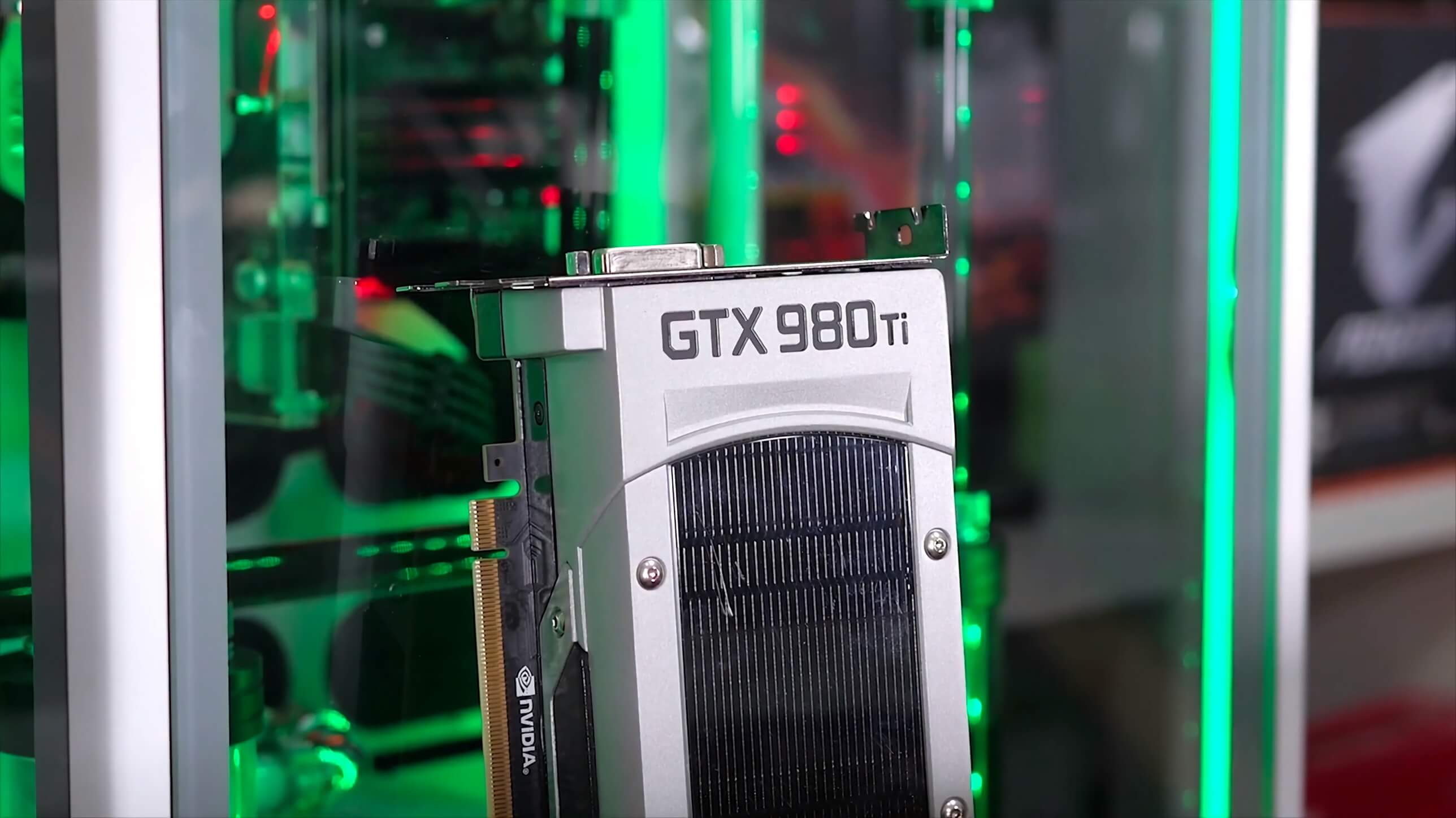Today we're revisiting the GeForce GTX 980 Ti to see how it stacks up to the newly released RTX 2060 and GTX 1660 Ti, particularly in more recent titles such as Apex Legends, Resident Evil 2 and Far Cry New Dawn. Of course, while the GTX 1660 Ti sells for $280 and the RTX 2060 is $350, the GTX 980 Ti was much more expensive at $650 at launch.
The GTX 980 Ti is now four years old, so you'd expect new GPUs around half the price to deliver a similar level of performance... or do they?
Whereas the 980 Ti packs 2816 CUDA cores, the RTX 2060 has 32% fewer cores and the 1660 Ti 45% fewer cores. But those Turing cores are wider, allowing them to execute more instructions, and they're also clocked higher. The Nvidia spec for the 980 Ti calls for a boost clock of 1075 MHz. This gives the RTX 2060 a 56% clock speed advantage, and the GTX 1660 Ti a 65% clock speed advantage.
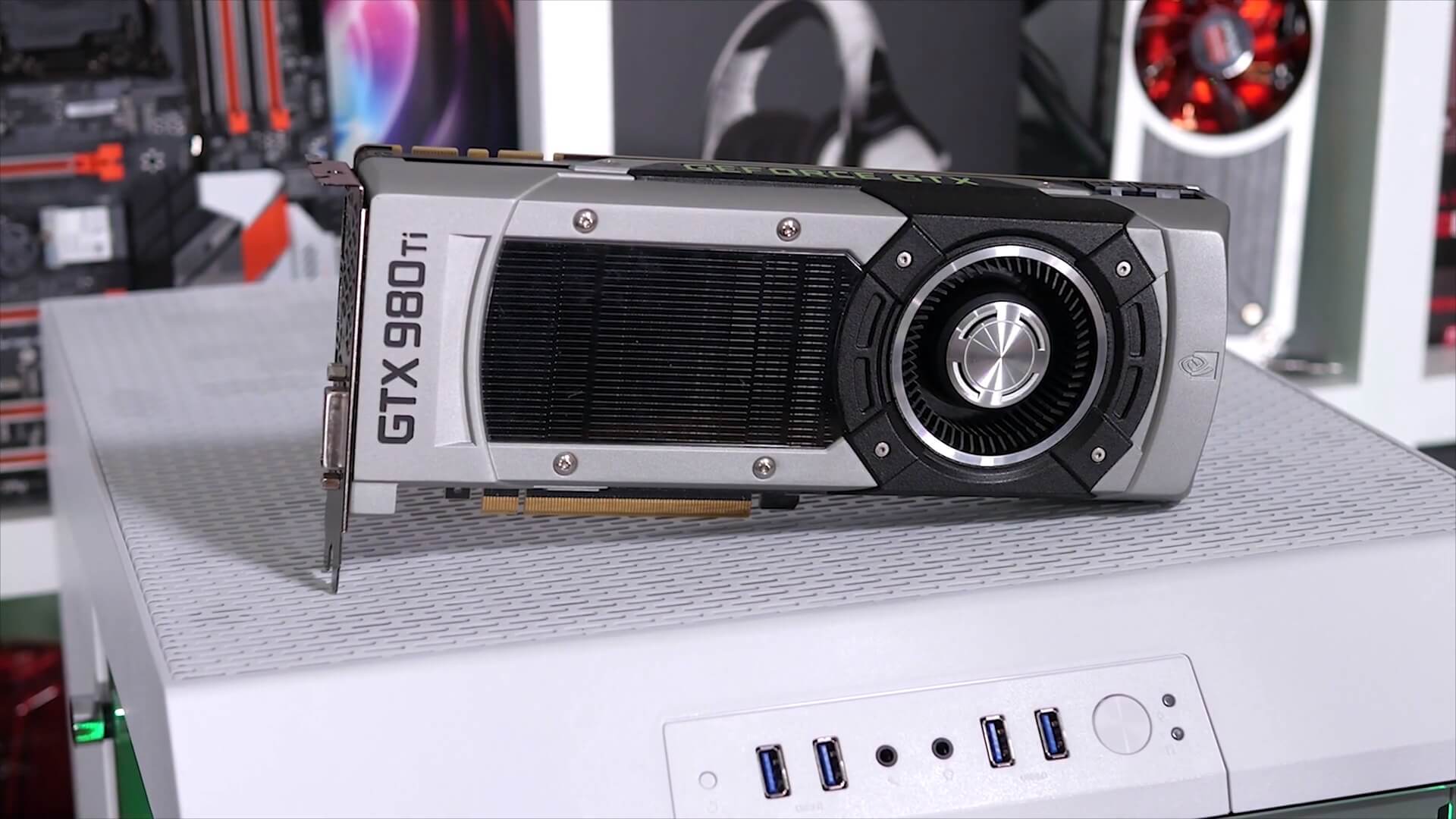
The Turing GPUs also feature higher clocked GDDR6 memory, so even though the RTX 2060 has a 192-bit memory bus opposed to the much wider 384-bit bus of the 980 Ti, the faster memory makes up for the difference, so both have the same 336 GB/s memory bandwidth. The 1660 Ti has been downgraded to 288 GB/s with its 12 Gbps memory, but as we've learned already, this doesn't cripple it much.
Earlier this year in our "Ultimate Guide to Buying a Used Graphics Card" we found the average selling price of an used GTX 980 Ti was $235. We took a look again at completed eBay listings when we were working on this article and that price remains accurate.
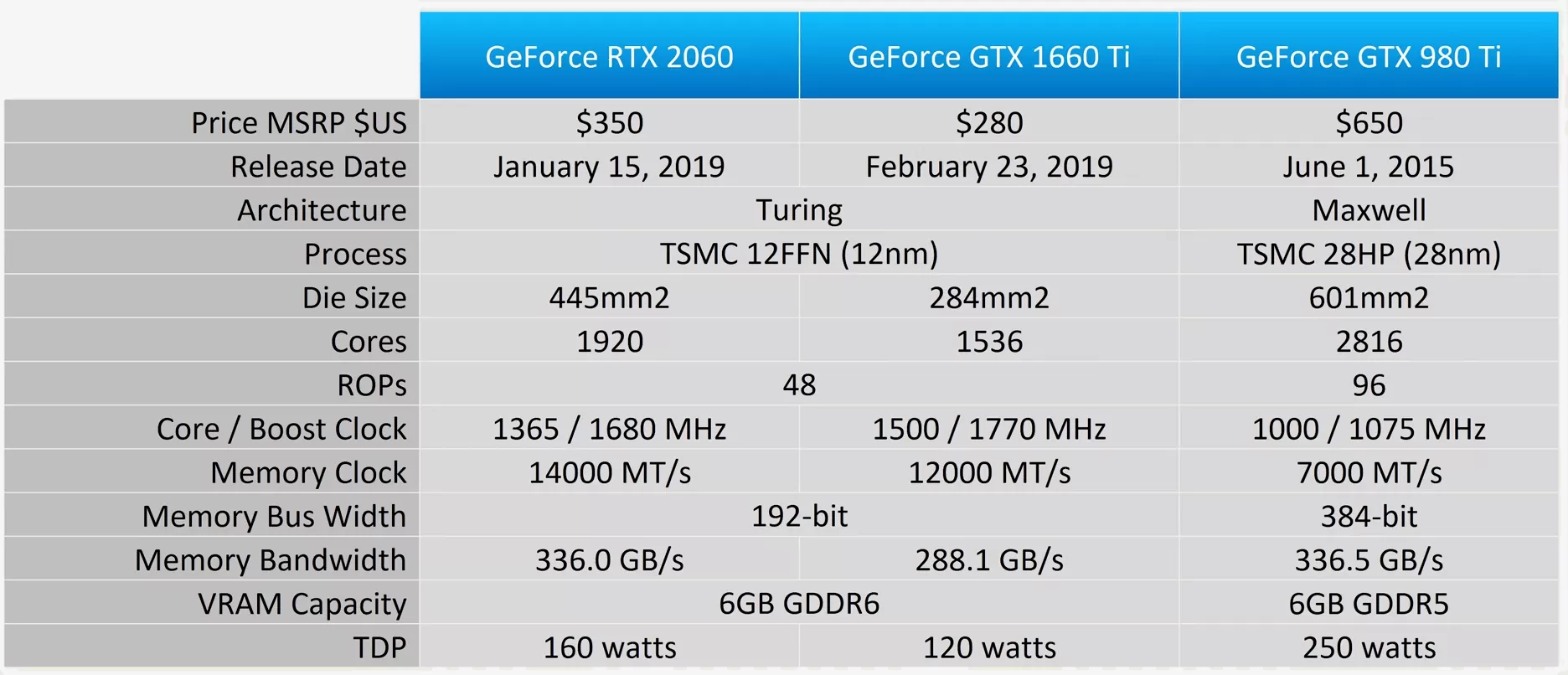
So that makes this comparison all the more interesting... if you would consider it, should you get the 980 Ti for around $235 or buy a brand new GTX 1660 Ti for $280? To find out we grabbed our Core i9-9900K test system, installed the 980 Ti and got benchmarking. We tested 33 games in total but we'll be discussing the results for a dozen of them before looking at the summary and performance breakdown graphs. All testing took place at 1440p, and while we are using a reference card, we overclocked it 1190 MHz, allowing it to hold a typical boost clock of 1.3 GHz. With those notes out of the way, let's get into the results.
Benchmarks
Rather than limiting this test to a dozen or so titles, we wanted to aim for at least 30. This gives us a fuller perspective of how the older Maxwell GPU stacks up and how performance in older games compare to recently released ones. We mention this because to test such a massive range of games, it didn't make sense to invest twice as much time testing the 980 Ti at different clock rates. In choosing to go with either the Nvidia spec or an aggressive factory overclock, we went with the latter. For the most part the overclocked configuration offers 10% performance, with gains as large as 15% seen under certain conditions.
Our first test Metro Exodus was the only game in which we included the stock 980 Ti result as a reference. Here we see that the overclock provided a 9% performance boost, which is decent.
The 980 Ti goes from being slightly slower than the GTX 1070 to slightly faster. This reference point serves us well and it's usually what would find on the higher-end AIB models, such as Gigabyte's Gaming G1 for example.

The overclocked 980 Ti performs extremely well in Shadow of the Tomb Raider, beating the GTX 1070 by a few frames to come in just 2fps down on the 1660 Ti and 1070 Ti.
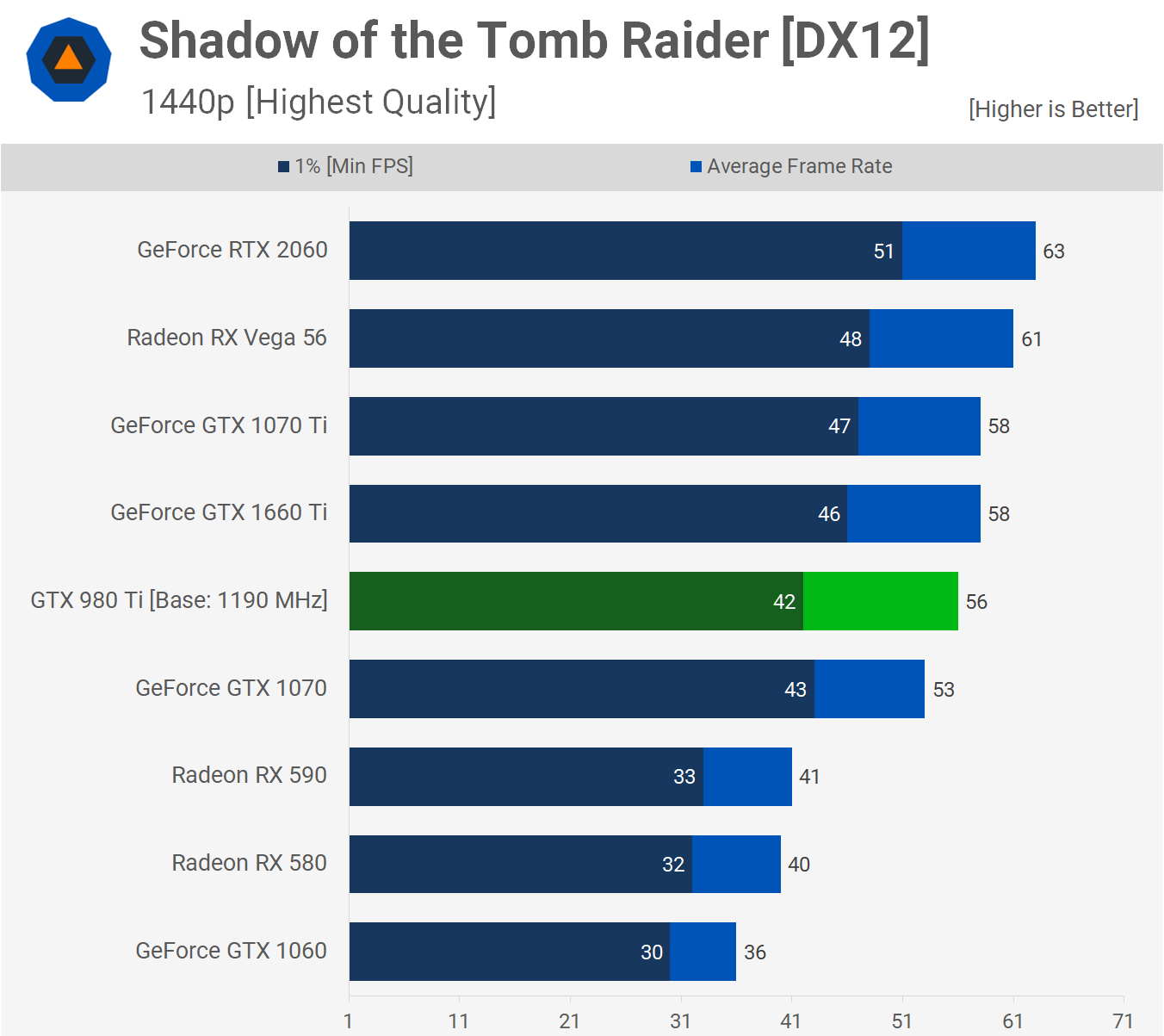
Moving on we find that Forza Horizon 4 is a good game to include in this comparison as it utilizes modern GPU architectures really well. The GTX 980 Ti was only able to match the Radeon RX 590, making it ~10% slower than the 1660 Ti and RTX 2060.
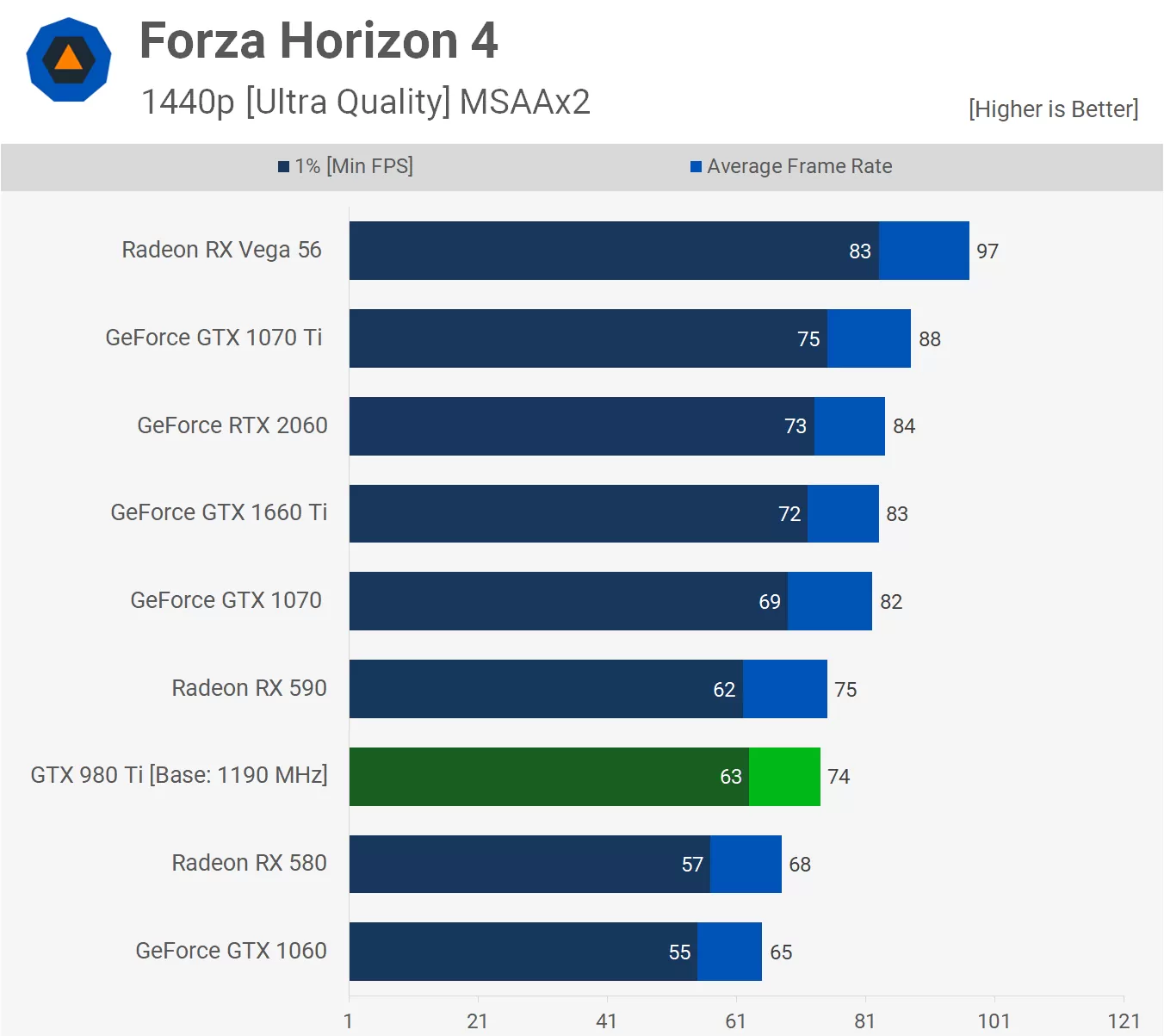
Next up we have Just Cause 4 and here the GTX 980 Ti came in just behind the GTX 1070 and 1660 Ti. Nothing that unusual about these results, so let's move on.
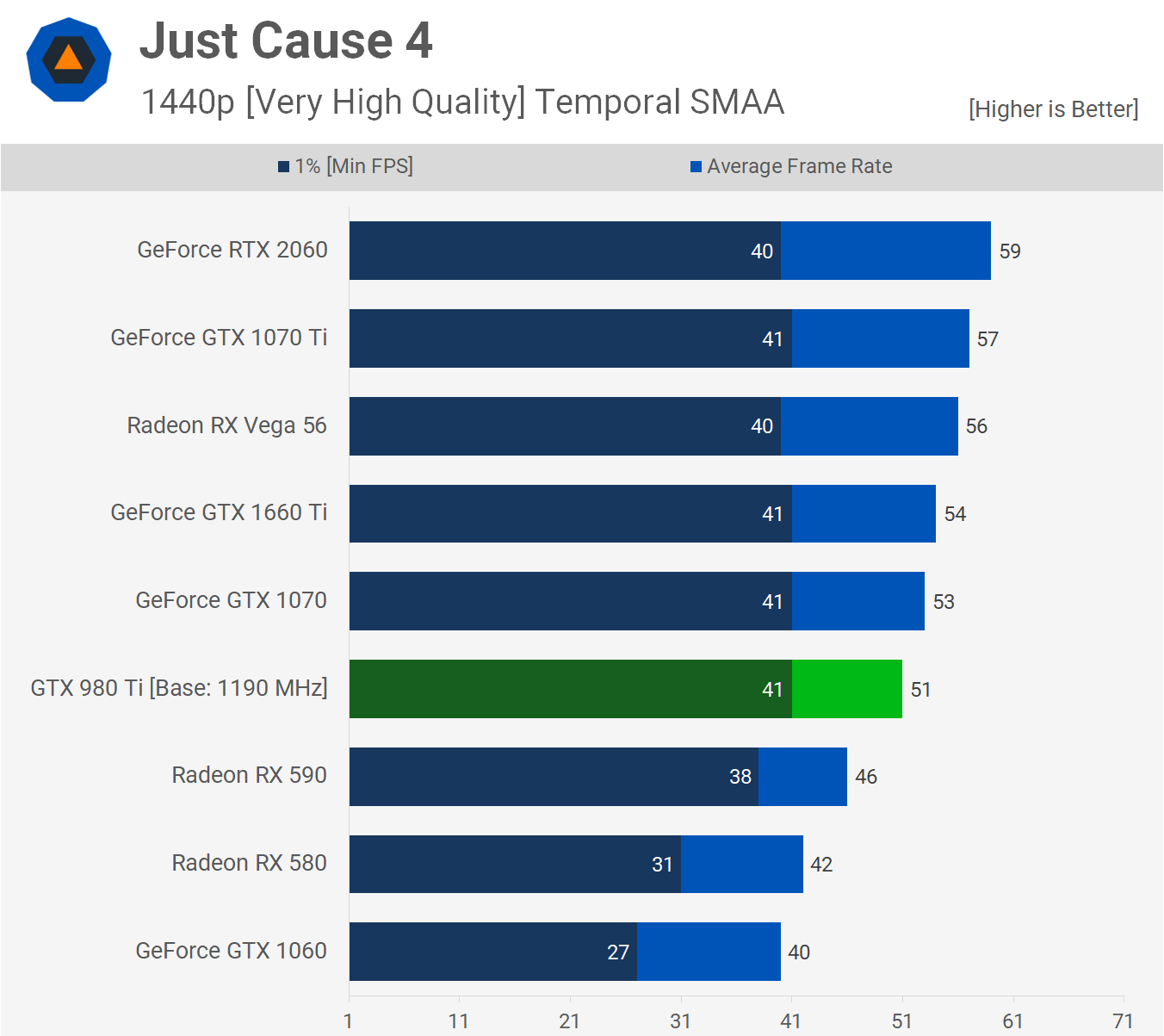
Firing up Resident Evil 2 we see that the overclocked 980 Ti is able to roughly match the GTX 1660 Ti, making it 16% slower than the RTX 2060.
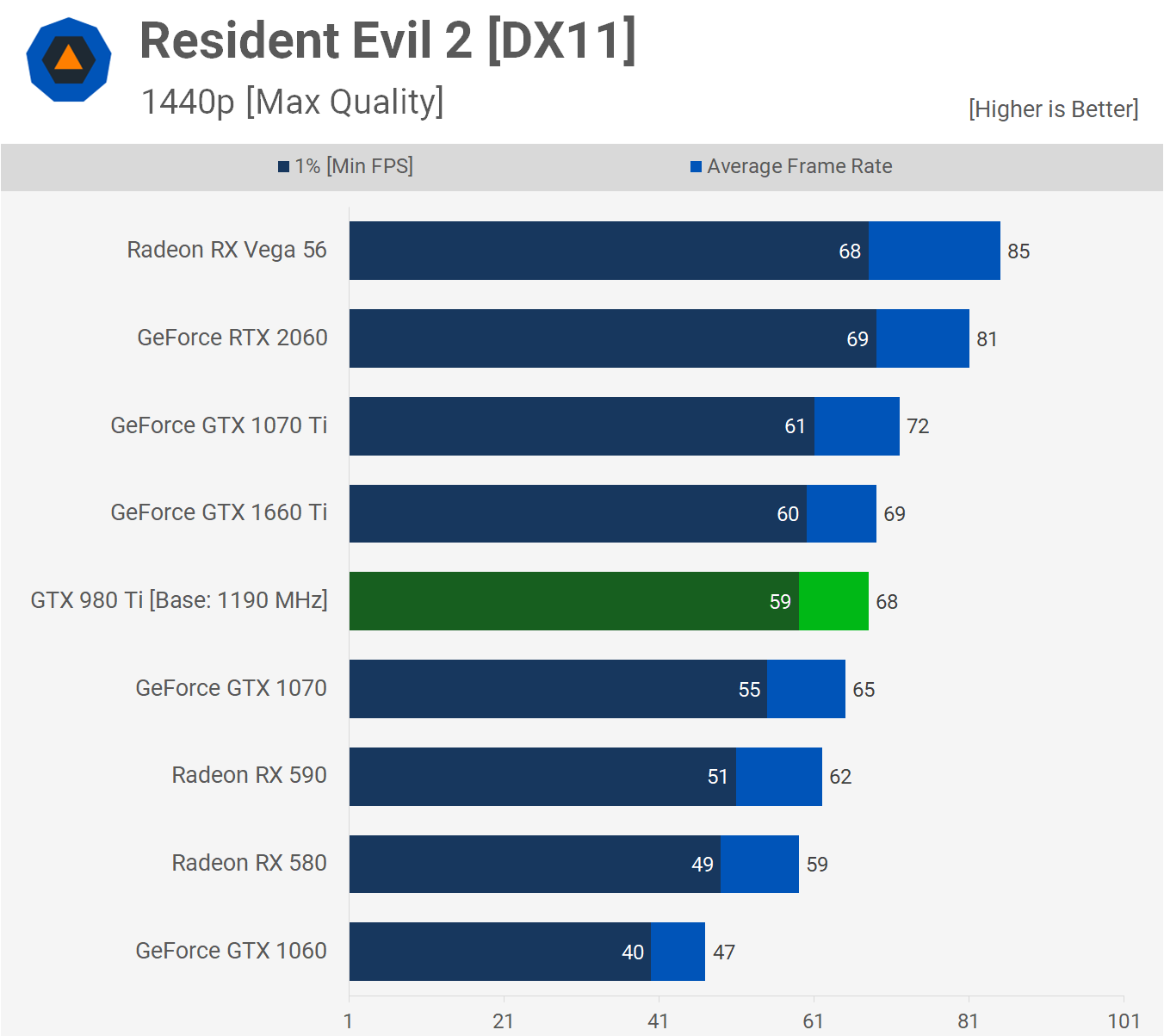
Testing with Hitman 2 saw the 980 Ti match the GTX 1660 Ti while it was 14% slower than the RTX 2060 and 16% slower than Vega 56. Still a pretty solid result for the old Maxwell GPU.

Fortnite uses the Unreal Engine 4 and this game engine is very familiar with the Pascal architecture.
Here the overclocked 980 Ti just edged out both the GTX 1070 and 1660 Ti to come in just behind the GTX 1070 Ti and not much slower than the RTX 2060. It also beat AMD's Vega 56 by a 6% margin.
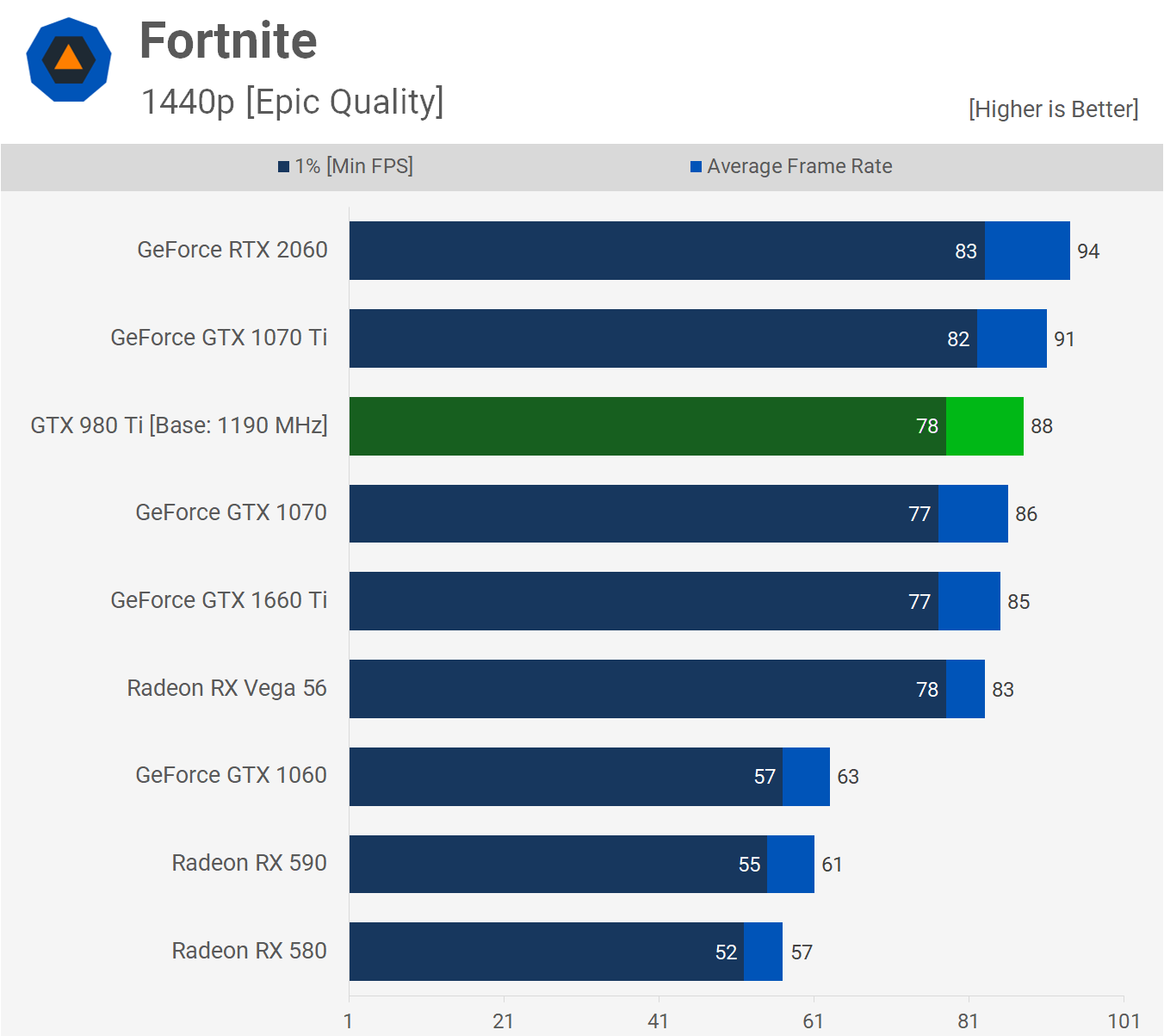
The GTX 980 Ti performs really well relative to the Pascal competition, beating the 1070 by a few frames. That said, Turing performs very well in this title and as such as the 980 Ti was 10% slower than the 1660 Ti and 22% slower than the RTX 2060.

When testing with Battlefield V we see that the overclocked GTX 980 Ti is on par with the GTX 1070 and we also find much the same when comparing it to the GTX 1660 Ti.
The 980 Ti was 14% slower than a typical AIB version of the RTX 2060, not a massive margin but given the Maxwell GPU used to set us back $650, the fact that we're not getting more performance for just $350 is good news.
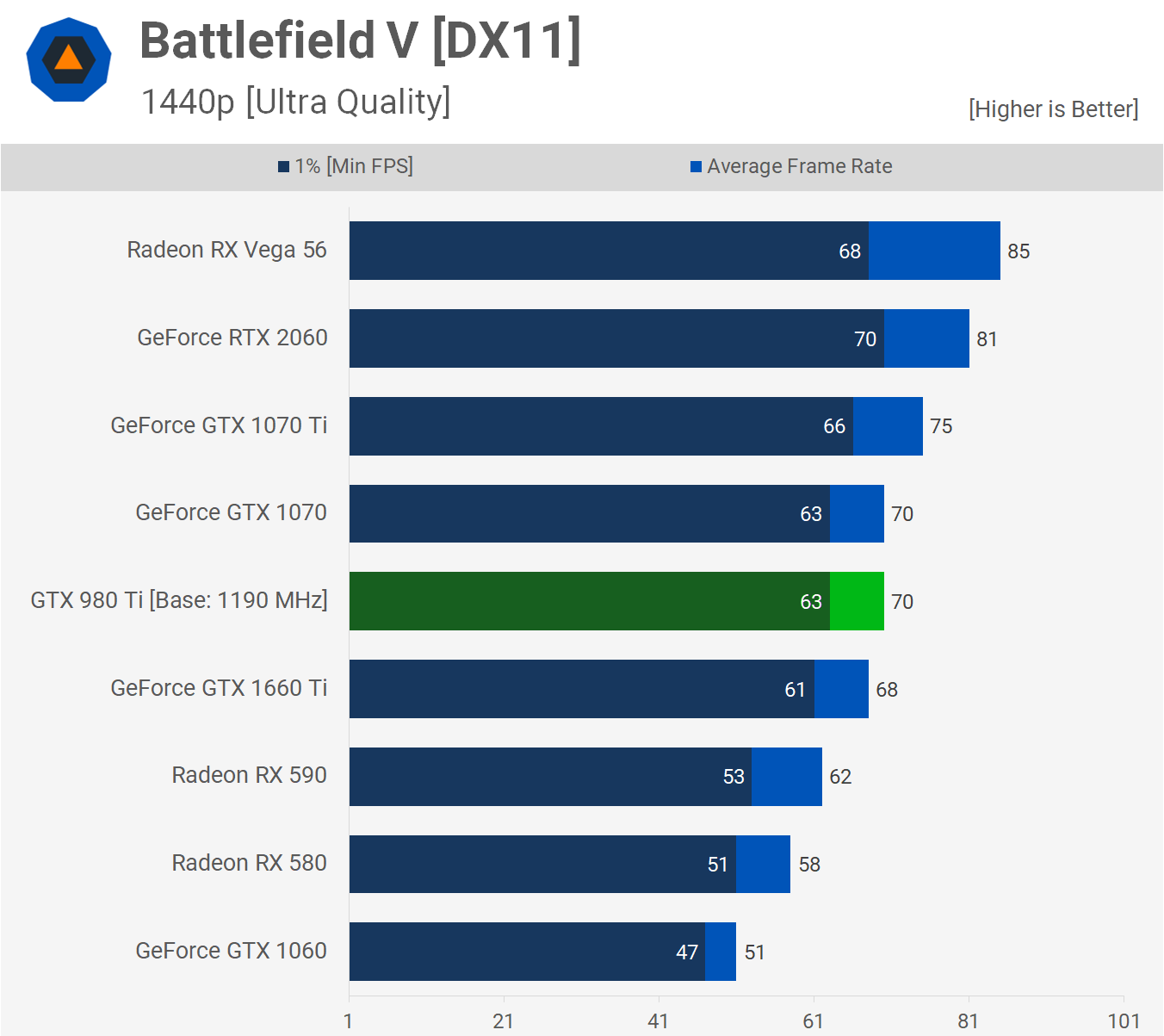
Although it's gone through several major updates, World of Tanks is still a very old game at its core. It's also well optimized for older GPU architectures and Nvidia has made sure their older GPUs still perform as they should in this popular title. In the case of the 980 Ti that means delivering GTX 1070 Ti-like performance making it 16% faster than the 1660 Ti and just 6% slower than the RTX 2060.
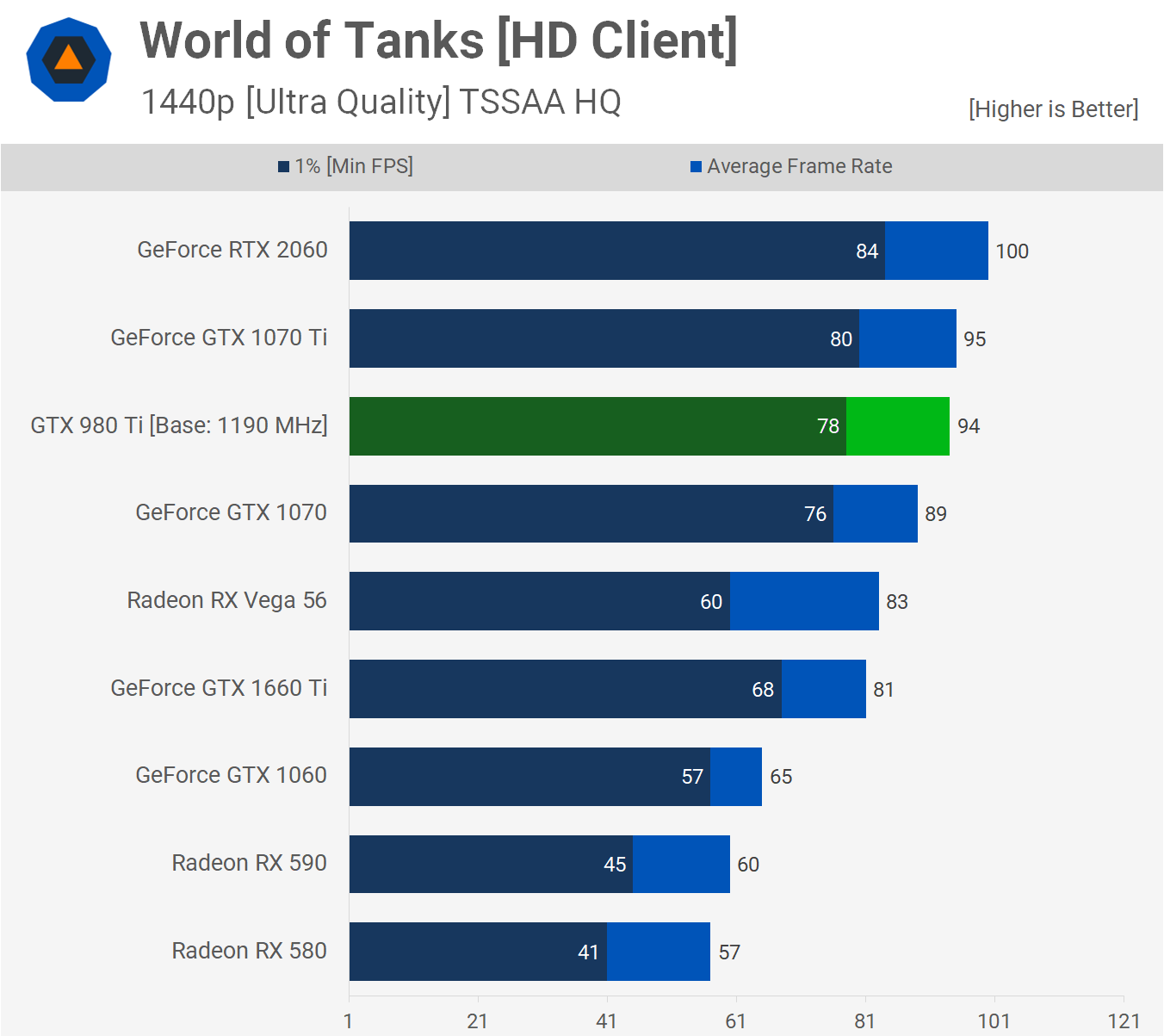
Apex Legends is one of the newest games we're testing and as you can see the overclocked GTX 980 Ti falls just short of the GTX 1070, behind the GTX 1660 Ti, and massively behind the RTX 2060.
The gap to Pascal isn't too big but the more complex Turing architecture provides a significant performance uplift here, especially if we were to compare GPUs with similar core counts.
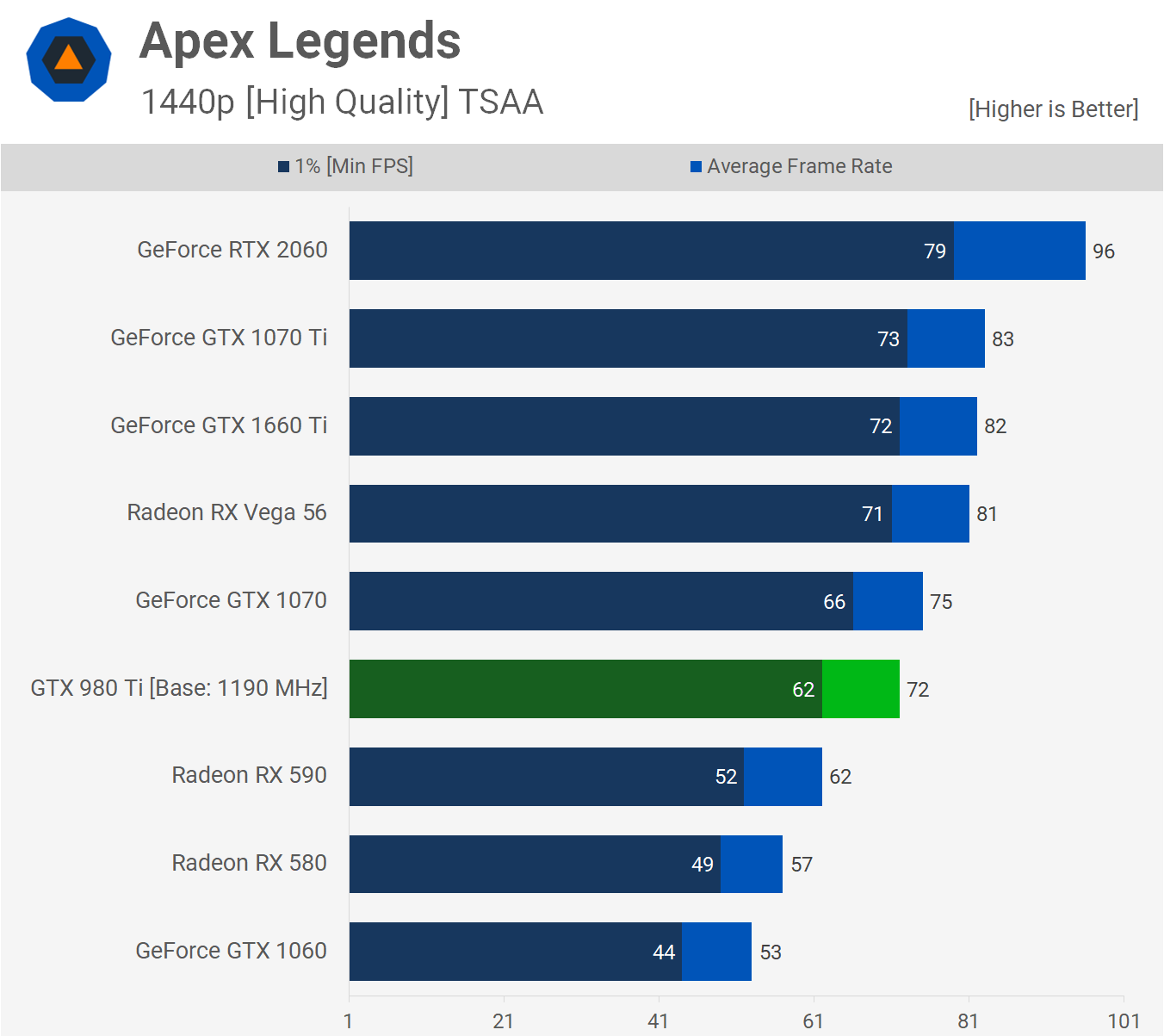
The last game in this round is Far Cry New Dawn. Here the overclocked 980 Ti matched the stock GTX 1070 and 1660 Ti with an average of 74 fps. It was 15% slower than the RTX 2060, though I'm not suggesting that makes the budget RTX option a worthwhile upgrade for current 980 Ti owners... it is not.

Individual Matchups
GTX 980 Ti vs. GTX 1070
As we've found time and time again in the past, the GTX 980 Ti and GTX 1070 deliver basically the same performance. At the stock Nvidia spec the 1070 is generally a little faster and with both overclocked to the max they are also very close, though the 980 Ti generally does a little better overall thanks to its huge degree of overclocking headroom.

GTX 980 Ti vs. Vega 56
For the most part we found the stock Vega 56 beating the 980 Ti. On average the old GeForce GPU was 7% slower on average with only 5 games where the 980 Ti won by a 5% margin or better. But given what you typically pay for one of these things on the used market, they are often a better choice for budget conscious shoppers.

GTX 980 Ti vs. GTX 1660 Ti
Overall the venerable 980 Ti was a whisker faster, edging the budget Turing GPU by a mere 2% margin. Of course, while we used a stock MSI GTX 1660 Ti Gaming X, the 980 Ti was overclocked. That said, you can only squeeze about 5-10% more out of the 1660 Ti anyway. It's still great to see we're finally getting GTX 980 Ti levels of performance for under $300.

GTX 980 Ti vs. RTX 2060
Even with the overclock boost the 980 Ti can't hang with a stock RTX 2060. On average the Maxwell part was 12% slower, but we also saw instances where it was 20 to 25% slower, for example in Assassin's Creed Odyssey, Rainbow Six Siege, Wolfenstein II and Apex Legends.

Bottom Line
The once mighty GeForce GTX 980 Ti is now a match for a sub-$300 GPU, only took about 4 years. If you dropped $650 on a 980 Ti all those years ago and you still have it today, gaming at 1440p, then it's fair to say you got your money's worth.
Evidently for such a person the GTX 1660 Ti and RTX 2060 won't warrant an upgrade, as that would be more of a side-grade. That said, if you're a $650 GPU kind of shopper then it was unlikely these mid-range offerings were ever going to entice you. For that you're probably after an RTX 2080 – in titles such as Metro Exodus you'd been looking at just over a 60% performance boost, which is way more significant.
Now, if you're tossing up between buying a new GTX 1660 Ti or a used GTX 980 Ti... while you could potentially save around $50 by buying the 980 Ti (used price hovers around $235), there's always the possibility that you might have to pay more for a good model. Alternatively, if you're willing to bide your time, you could manage to get one for even less. There's a bit of an art to buying second hand, but no matter how good you are there are still some unavoidable pitfalls.
Obviously the 980 Ti is an old product now, so there will be no warranty involved. The risk for $50 savings doesn't seem worth it. There's also the issue of driver support. Without question the GTX 1660 Ti is going to age better moving forward with game specific optimizations.
All in all, the GTX 980 Ti has aged well and today it's still capable of delivering an enjoyable 1440p gaming experience. Ask any enthusiast and that's saying a lot.
